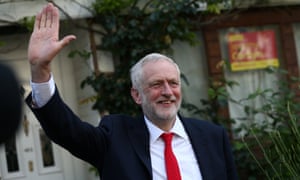This is one of the most sensational political upsets of our time. Theresa May – a wretched dishonest excuse of a politician, don’t pity her – launched a general election with the sole purpose of crushing opposition in Britain. It was brazen opportunism, a naked power grab: privately, I’m told, her team wanted the precious “bauble” of going down in history as the gravediggers of the British Labour party. Instead, she has destroyed herself. She is toast.
She has just usurped David Cameron as the “worst ever prime minister on their own terms” (before Cameron, it had been a title held by Lord North since the 18th century). Look at the political capital she had: the phenomenal polling lead, almost the entire support of the British press, the most effective electoral machine on Earth behind her. Her allies presented the Labour opposition as an amusing, eccentric joke that could be squashed like a fly that had already had its wings ripped off. They genuinely believed they could get a 180-seat majority. She will leave No 10 soon, disgraced, entering the history books filed under “hubris”.
But, before a false media narrative is set, let me put down a marker. Yes, the Tory campaign was a shambolic, insulting mess, notable only for its U-turns, a manifesto that swiftly disintegrated, robotically repeated mantras that achieved only ridicule. But don’t let media commentators – hostile to Labour’s vision – pretend that the May calamity is all down to self-inflicted Tory wounds.
This was the highest turnout since 1997, perhaps the biggest Labour percentage since the same year – far eclipsing Tony Blair’s total in 2005. Young and previous non-voters came out in astonishing numbers, and not because they thought, “Ooh, Theresa May doesn’t stick to her promises, does she?” Neither can we reduce this to a remainer revolt. The Lib Dems threw everything at the despondent remainer demographic, with paltry returns. Many Ukip voters flocked to the Labour party.
No: this was about millions inspired by a radical manifesto that promised to transform Britain, to attack injustices, and challenge the vested interests holding the country back. Don’t let them tell you otherwise. People believe the booming well-off should pay more, that we should invest that money in schools, hospitals, houses, police and public services, that all in work should have a genuine living wage, that young people should not be saddled with debt for aspiring to an education, that our utilities should be under the control of the people of this country. For years, many of us have argued that these policies – shunned, reviled even in the political and media elite – had the genuine support of millions. And today that argument was decisively vindicated and settled.
Don’t let them get away with the claim that, “Ah, this election just shows a better Labour leader could have won!” Risible rot. Do we really think that Corbyn’s previous challengers to the leadership – and this is nothing personal – would have inspired millions of otherwise politically disengaged and alienated people to come out and vote, and drive Labour to its highest percentage since the famous Blair landslide? If the same old stale, technocratic centrism had been offered, Labour would have faced an absolute drubbing, just like its European sister parties did.
Labour is now permanently transformed. Its policy programme is unchallengeable. It is now the party’s consensus. It cannot and will not be taken away. Those who claimed it could not win the support of millions were simply wrong. No, Labour didn’t win, but from where it started, that was never going to happen. That policy programme enabled the party to achieve one of the biggest shifts in support in British history – yes, eclipsing Tony Blair’s swing in 1997.
And what of our young? They have suffered disproportionately these past few years: student debt, a housing crisis, a lack of secure jobs, falling wages, cuts to social security – the list goes on. Young voters have been ignored, ridiculed, demonised even. They just don’t care about politics, it’s said, or they’re just too lazy. “Under-30s love Corbyn but they don’t care enough to get off their lazy arses to vote for him!” one unnamed Tory MP told the Huffington Post’s Owen Bennett. Those young voters did indeed get off their “lazy arses”, and they kicked several Tory MPs’ arses out of the House of Commons.
And then there’s the media onslaught. Even by the standards of our so-called free press – a stinking sewer at the best of times – its campaign against Corbyn and the Labour party was utterly nauseating. Smears of terrorism, extremism, you name it. They believed they could simply brainwash millions of Britons. But people in this country are cleverer than the press barons think, and millions rejected their bile.
But a note about Corbyn, and the leadership, too. I owe Corbyn, John McDonnell, Seumas Milne, his policy chief Andrew Fisher, and others, an unreserved, and heartfelt apology. I campaigned passionately for Corbyn the first time he stood, and I voted for him twice. A few weeks ago, a senior Labour MP denounced me as one of the chief gravediggers of the Labour party, and journalists have suggested I should be knighted by the Tory party for my efforts.
But I came to believe that, yes, indeed Labour was heading for a terrible defeat that would crush all the things I believed in. That’s what all the polling, byelections and the local elections seemed to say. I thought people had made their minds up about Corbyn, however unfairly, and their opinion just wouldn’t shift. I wasn’t a bit wrong, or slightly wrong, or mostly wrong, but totally wrong. Having one foot in the Labour movement and one in the mainstream media undoubtedly left me more susceptible to their groupthink. Never again. Corbyn stays and – if indeed the Tories are thrown into crisis as Brexit approaches – he has an undoubted chance of becoming prime minister, and a fine prime minister he would make too.
Now that I’ve said I’m wrong – perhaps one of the sweetest things I’ve had to write – so the rest of the mainstream commentariat, including in this newspaper, must confess they were wrong, too. They were wrong to vilify Corbyn supporters – from the day he stood – as delusional cultists. They were wrong to suggest Corbyn couldn’t mobilise young people and previous non-voters. They were wrong to suggest he couldn’t make inroads in Scotland. They were wrong to suggest a radical left programme was an automatic recipe for electoral catastrophe. No, Labour hasn’t formed a government. But it is far closer than it has been for a very long time. The prospect of a socialist government that can build an economy run in the interests of working people – not the cartel of vested interests who have plunged us into repeated crisis – well, that may have been a prospect many of us thought would never happen in our lifetime. It is now much closer than it has ever been. So yes – to quote a much-ridiculed Jeremy Corbyn tweet: the real fight starts now.






1 opmerking:
Zo heeft het foute establishment-PR-bedrijf de Volkskrant het steeds over "de orthodox linkse ideeëen" van Corbyn.......,zoals vrijdag j.l. op de voorpagina..........
en krijgen n.b. de kiezers de schuld een "practical joke" uitgehaald te hebben met May, omdat ze haar niet aan een absolute meerderheid hebben geholpen.......
Een reactie posten